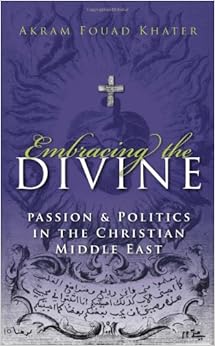Gender, Politics, and Passion in the Christian Middle East
Scholars have long neglected the Middle East’s Christian communities in general and Christian women in particular. In this episode, Akram Khater draws attention to the biography of Hindiyya al-'Ujaimi (1720-1798) to explore the religious and political upheavals of 18th-century Aleppo and Mount Lebanon. Hindiyya’s story speaks to the dynamic history of the Maronite Church, the fraught encounter between Arab and European Christianities, and the role of faith as a historical force. For half a century, she held as much sway over the Maronite Church as any other cleric. The extent of her influence won her powerful enemies in Lebanon and the Vatican. Hindiyya weathered one inquisition but was eventually convicted of heresy and confined to a solitary cell for the final decade of her life. The story of her ascent and demise illuminates gendered aspects of piety and politics in the Christian Middle East.
Stream via Soundcloud PARTICIPANT BIOS
 |
Akram Fouad Khater is University Faculty Scholar, Professor of History, and holds the Khayrallah Chair in Diaspora Studies at North Carolina State University, where he also serves as the Director of the Khayrallah Center for Lebanese Diaspora Studies. He is the author of many publications, including two monographs, Inventing Home: Emigration, Gender and the Making of a Lebanese Middle Class, 1861-1921 (2001) and Embracing the Divine: Passion and Politics in the Christian Middle East (2014). Akram Khater is the current editor of the International Journal of Middle East Studies.
|
 |
Graham Auman Pitts is a PhD Candidate in Georgetown University's History department, where he studies the environmental history of the modern Middle East. He is currently finishing a dissertation entitled "Fallow Fields: Famine and the Making of Lebanon (1914-1952)," which probes the intersections of ecology, capital, and colonialism.
|
CREDITS
Episode No. 229
Release Date: 8 March 2016
Recording Location: Khayrallah Center for Lebanese Diaspora Studies, North Carolina State University
Editing and production by Chris Gratien
Sound excerpts from archive.org uploaded by fidika: Baglamamin Dugumu - Necmiye Ararat and Muzaffer; Ben Yemenimi Al Isterim - Hafiz Burhan; Harmandali - Recep Efendi, Cemal Efendi; Nazmiye - Rizeli Sadik; Katibim (Uskudar'a Gider iken) - Safiye Ayla
Image courtesy of Akram Fouad KhaterSELECT BIBLIOGRAPHY
 |
| Akram Fouad Khater, Embracing the Divine Syracuse University Press, 2014 |
_____. "Eastern Christians, Islam, and the West: A Connected History." International Journal of Middle East Studies 42.03 (2010): 475-478.
Khater, Akram Fouad. Embracing the Divine: Passion and Politics in the Christian Middle East. Syracuse University Press, 2014.
_____. Inventing Home: Emigration, Gender, and the Middle Class in Lebanon, 1870-1920. Univ of California Press, 2001.
Masters, Bruce. Christians and Jews in the Ottoman Arab world: the Roots of Sectarianism. Cambridge University Press, 2004.
Salibi, Kamal. Maronite Historians of Mediæval Lebanon. American University of Beirut, 1959.
Semerdjian, Elyse. " Off the Straight Path": Illicit Sex, Law, and Community in Ottoman Aleppo. Syracuse University Press, 2008.
Van Leeuwen, Richard. Notables and Clergy in Mount Lebanon: The Khāzin Sheikhs and the Maronite Church, 1736-1840. Brill, 1994.
Volney, Constantin-François. Travels Through Syria and Egypt, in the Years 1783, 1784, and 1785: G. Robinson, 1805.








Comments
Post a Comment
Due to an overwhelming amount of spam, we no longer read comments submitted to the blog.